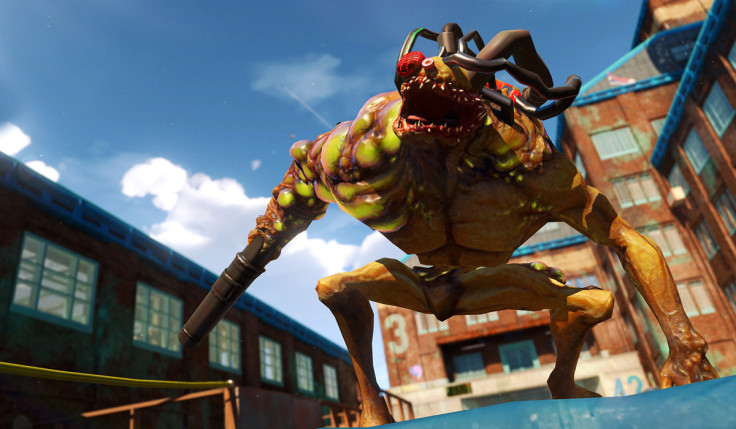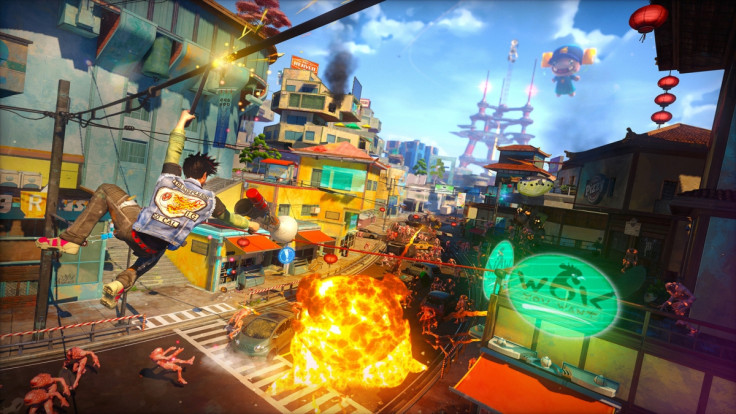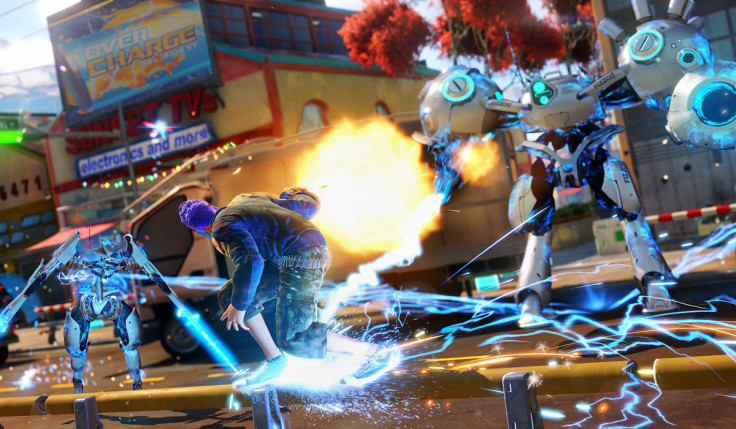Sunset Overdrive Interview: Insomniac Games' James Stevenson On Colour, Character and 90s Influences

Sunset Overdrive is one of the year's biggest new intellectual properties (IPs) and one of Microsoft's key exclusives for the Xbox One. Bright and vibrant, everything in Insomniac's open world action game serves a single driving focus on fun.
At a recent Microsoft event we were lucky enough to play the first hour of the game (you can read our impressions here) and speak to James Stevenson, Insomniac's Community Lead, about the game's tone, its lead character, and its 90s influences.
Is it safe to say Sunset Overdrive hopes to bring colour back to video games?
Honestly, one of the first things we ever said about the game was 'no grey and no rubble'. We'd spent 8 years making Resistance so we were ready to be done with that grey/brown colour palette and move on to something that has colour and is exciting. That was an early goal for sure.
So was Resistance the main reason for it?
I wouldn't say it was the main reason, it was just after working on it for that amount of time, we wanted to do something a little different and we were excited with the direction and early on we know we had that art style which has this colourful universe.
How open is the game's open world? How big is it? Is it segmented with areas unlocked as you progress?
There's no gating, so if you wanted to you could run and see the whole city [from the start]. You'd get into tougher enemies and a few skyscraper areas which you may not necessarily have all the traversal moves to make some of the leaps between rooftops etc – moves like air dash and other things that extend your jump.
You can certainly go off into those areas though, but you won't find missions yet. You might find collectibles and challenges, some are really hard without the right moves, but you can explore the whole city right from the start.

You've made it clear that players will be able to create their own characters in the game, but do they have any input in shaping the actual character of their chosen avatar?
The story for the character – he or she, and they're both fully voiced –is written and that is it, the story of the saviour of Sunset City. You go through that character arc and the story how we intended it for the player, but how you appear and how you play – what weapons you choose, what you wear, what amps and powerups you equip – is really up to you, and that was what was really important for us, even though we had this story in mind that we wanted to tell.
To what extent are the various weapons on offer cosmetic differences for weapons that essentially have the same affect? How many weapons genuinely offer something different?
It's a fully fleshed out arsenal. You certainly have guns that do similar things, but it's not like ten different machine guns with slightly different rates of fire or slightly different damages, our weapons are all fairly different. Some are in similar classes, some are rapid fire, some are shotguns, some are high damage and some are really unique that you won't see in other games. I definitely think we did a good job of spreading them out. I mean look at all our Ratchet & Clank games, and Resistance, while there will be some weapons that are kind of similar they will definitely have different feels and uses. That's something that's always been important to us.
How did working on Fuse aid the development of Sunset Overdrive?
[Fuse] was important for the studio because we rebuilt our engine from the ground up, and we rebuilt our tools. I think without that new engine and without the tools that we had on that game. I don't know if we could have made this without the improvements we made with Fuse. That game built a lot of the groundwork for our success so far with Sunset and our work on next gen consoles.

The game is a late-90s, early-00s throwback of sorts. What were your key influences culturally and in terms of specific video games?
Just in general, I Am Legend and The Omega Man were really big influences – you think of Will Smith hitting golf balls off an aircraft carrier or Charlton Heston in this big convertible down the streets of LA, we wanted to have that sort of fun in the end times. You can do whatever you want, play your music loud, run along buildings, blow s**t up, that sort of overarching theme.
I think how that taps into that 90s/Dreamcast ethos is those games were games, didn't bother with realism and didn't take themselves seriously - they had colour, they had blue skies, they enjoyed themselves. Like Crazy Taxi doesn't make any sense at all but it's still awesome, and you think back to that and it's so memorable, so fun at the time. Certain games like Jet Grind Radio, even Tony Hawk were certainly influences on us.
It's really a combination of all those things, but even playing the game you'll see all these references to cultural influences across the entire game, whether its references to characters, stories, Breaking Bad, Arrested Development, or whatever it might be, we just had a lot of fun packing it with ourselves, our personalities and what we like.
Overdrive is a very self-aware game with a clear sense of humour, what challenges are presented by presenting a game as a comedy?
It certainly has a comedic element and comedy is always so tough to get right. I think it's funny, some people will inevitably find it funnier than others but we really wanted it to be self-aware. We didn't want to take it too seriously, there was always some level of us needing to wink back to the player.
Another great cultural influence for us was Scott Pilgrim, in that it's totally aware that it's a comic book, or in the case of the movie, totally aware that it's a movie. It's sort of funny actually because that was a comic book that was influenced by video games and really we are a video game that was influenced by a movie which was influenced by a comic that was influenced by a video game, so really it comes full circle in the end.
There was definitely that moment when we realised we couldn't take ourselves seriously at all, and I think players would see through it if we tried to, so we had fun finding ways to break the fourth wall and be very aware of the fact that this is a game, it's fun and it doesn't have to take itself seriously.
Sunset Overdrive will be released on 31 October, 2014, for Xbox One.
© Copyright IBTimes 2025. All rights reserved.






















